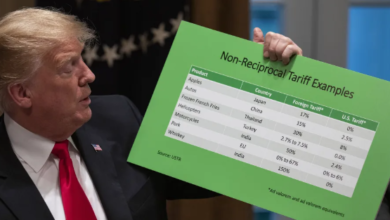How Michigan Became The Biggest State Legislative Battleground Of 2022

When Curtis Hertel Jr. became one of just 10 Democrats in the Michigan state Senate in 2014, the idea that his party might one day regain control of the state legislature was beyond far-fetched. Republicans have held firm majorities in the state Senate since 1984 and the state House of Representatives since 2011. In the last round of redistricting, the GOP gerrymandered the body to the point that it was essentially impossible for them to lose.
But everything has changed ahead of this year’s midterm contests. In 2018, Michigan voters put an independent redistricting commission in charge of drawing new district maps. Last year, the commission approved maps that were significantly more competitive than their predecessors, a change that has fueled Democratic hopes that the state Senate majority — and potentially control of the state House too — is finally up for grabs in 2022.
“For the first time in a very long time, I feel like we’re playing on an even playing field,” Hertel told HuffPost. “We’ve been playing a rigged game for three decades here in Michigan, and finally for the first time, it’s not rigged. We have maps that are even.”
Democrats have routinely been hammered at the state legislative level over the last decade: Between 2010 and 2018, the party lost hundreds of state legislative seats nationwide, and successful Republican gerrymandering schemes have rendered many majorities almost totally out of reach. In 2020, the Democratic Legislative Campaign Committee, a party political arm, poured record sums of money into such races, but failed to flip a single state legislative chamber.
The independent redistricting commission, though, has suddenly provided Democrats a path forward in Michigan, turning it into the biggest state legislative battleground of the 2022 cycle.
“We see Michigan as a huge opportunity because of the newly drawn fair maps,” said Jessica Post, the DLCC’s president. “It’s at the top of our flip list.”

JEFF KOWALSKY via Getty Images
Republicans currently hold a 22-16 majority in the Michigan state Senate, and a 56-53 grip on the state House, where one seat is held by an independent.
But other developments have bolstered Michigan Democrats’ beliefs that they can flip one or both chambers: The Supreme Court’s decision to overturn Roe v. Wade, the landmark ruling that legalized abortion nationwide in 1973, has seemingly upended a midterm landscape that seemed heavily tilted toward the GOP.
Michiganders will vote on an abortion rights referendum in November, after the state Supreme Court ruled against the Republican legislative majority’s efforts to block it from appearing on the ballot.
The issue is driving Democratic campaigns from the top of the ticket, where Gov. Gretchen Whitmer (D) has made protecting abortion rights a central focus of her reelection message, to the bottom: In May, just days after the draft Supreme Court decision overturning Roe leaked, Democrat Carol Glanville upset a GOP opponent in a special state legislative election. The victory may have portended a larger shift: Michigan is among the states that have seen a surge in women voter registrations since the Roe decision, according to Democratic strategist Tom Bonier.
The abortion fight is a lens, Democrats and progressives say, into how the gerrymandered legislature protected GOP majorities even when they were out of step with public sentiment. Polls show that a majority of Michiganders support legal access to abortion; in an election that may be defined by that issue more than any other, the fairer maps mean that the composition of the state legislature — and the Senate in particular — will likely reflect the majority of votes cast in such races across the state.
“Instead of a state legislative majority focused on banning life-saving health care or looking the other way while poisonous water flowed from families’ taps, with fairer districts for the first time in decades, there could be a majority in the legislature that represents the views of Michiganders — not right-wing extremism,” said Simone Leiro, a spokesperson for the States Project, a progressive organization that focuses on state legislatures and has also made Michigan a priority in 2022.
Despite Democrats’ enthusiasm for it, the independent redistricting commission did not result from an effort to boost them in particular. It instead grew out of a Facebook group of voters who were frustrated with a legislature that over the last decade had morphed into one of the most heavily gerrymandered bodies in the nation.
In 2014, as the nonprofit news outlet Bridge Michigan noted, Michigan Republicans won 27 of 38 state Senate races even though the overall vote count was almost evenly split between the parties. Two years later, Michigan Democrats narrowly won a slight majority of votes cast across all state House races. But at the end of election night, Republicans controlled 63 of 110 seats.
“No voter in Michigan, regardless of party, thought that politics and politicians were working for them. It was an issue, gerrymandering, that brought voters together across the political spectrum.”
– Nancy Wang, Voters Not Politicians
By 2017, Voters Not Politicians, a grassroots organization that sprung out of the original Facebook discussions, had collected 425,000 signatures on a petition calling for the adoption of an independent redistricting commission. The campaign took advantage of a quirk in Michigan law that allows citizen petition drives to propose constitutional amendments directly to voters if they obtain the requisite number of signatures.
Rampant gerrymandering practices, the group argued to voters, had created a litany of districts in which lawmakers were insulated from real threats to their seat, unless it came from a member of their own party. It created a legislature that was unresponsive to voters and their needs, and helped the GOP govern without much fear of blowback.
“Regardless of party affiliation, it was very clear that our politicians were not working for voters,” said Nancy Wang, a law professor at the University of Michigan who in 2017 co-founded Voters Not Politicians, a grassroots group that led the push for an independent redistricting commission. “They were using their political power to to serve special interests, and to keep themselves in power.”
That November, 61% of Michiganders voted to approve the creation of a 13-person redistricting commission that would feature four Democrats, four Republicans, and five nonpartisan commissioners.
“No voter in Michigan, regardless of party, thought that politics and politicians were working for them,” Wang said. “It was an issue, gerrymandering, that brought voters together across the political spectrum.”
The new maps are significantly more competitive, as differing analyses of them makes clear. The commission itself used data that showed they would still slightly advantage Republicans. The Princeton Gerrymandering Project, though, sees both the state Senate and state House maps as slightly favorable to Democrats.
“In the past, we would identify a handful — maybe half a dozen — frontline seats that were winnable,” said state Rep. Rachel Hood (D), whose Grand Rapids district became more competitive. “Now, with this sort of flood of more moderate seats, we have arguably between 15 and 25 seats in play, with 5-point plus or minus margins.”
That has already changed Michigan politically, regardless of who ultimately controls the state legislature after November’s elections, Wang argued.
“That’s what happens when you unrig your elections,” she said. “You see a lot of candidates have to fight for votes, they have to persuade voters to vote for them. And there are a lot more competitive districts.”
The independent redistricting process was not free of controversy or criticism, even from Democrats who are happy with the overall outcome.
The new maps reduced the number of majority-minority districts in the state legislature from 15 — 10 in the state House and five in the state Senate — to just five, according to Bridge Michigan. There’s not a single Black-majority district in the state Senate. The changes will hit metro Detroit particularly hard: The new maps carved up the state’s most populous city in a way that could make it much harder for Black candidates to win legislative seats.
Before the maps were finalized, Black lawmakers and voting rights groups accused the commission of misinterpreting data and called for it to redraw new districts. The commission’s maps “diminish the voice & representation of Black people and our issues,” state Sen. Marshall Bullock, a Democratic member of the Michigan Legislative Black Caucus, said in a statement last December. “It is unacceptable and must be addressed and corrected immediately.”
A coalition of lawmakers and outside groups ultimately sued this year, alleging that the maps violated the Voting Rights Act of 1965. The commission defended the maps and argued that they were in compliance with federal law. The Michigan Supreme Court dismissed the suit in February.
Democrats in Michigan and nationally are still broadly upset about the state House maps, a caveat nearly all of them append to otherwise enthusiastic praise for the commission’s work.
Post, of the DLCC, also cautioned that independent redistricting commissions are not necessarily a blanket solution to gerrymandering. Democrats have raised issues with the independent redistricting process in Arizona, and the concerns about Black and minority representation in Michigan are evidence, she said, that the independent commissions do not automatically guarantee totally fair representation.
With the new maps in effect, Voters Not Politicians has continued to spread the word about independent redistricting, encouraging voters to turn out for the first elections held under them.
“It’s a new world here in Michigan, because we took the power to gerrymander away from politicians and now that power is in the hands of voters,” Wang said. “This is going to be our first election under fair maps, where voters’ votes will determine who is elected. And we feel that energy on the ground.”
Democrats are hopeful that energy will pay dividends for the party’s candidates, who have homed in on the issues where the GOP’s deadlock on the legislature has allowed it to race Michigan to the right: A Democratic majority, they’ve argued, could seek to protect abortion access, implement new gun control measures, roll back Michigan’s anti-union “right-to-work” law and expand voting rights.
“What we want to do is what Michiganders want,” Hertel said. “These are all policies that have been protected by a gerrymandered majority. They are majority opinions that have been stuck because of a gerrymandered legislature. And I think this is the year we change that. Roe is on the ballot. Democracy itself is on the ballot. The rights of our friends and neighbors are on the ballot.”
That doesn’t mean Democrats are assured control of the state Senate or state House in November. But at least now, he argued, they have a chance.
“Under the old maps, we could get everything right and still lose,” he said. “Under these maps, I strongly believe that the opportunity is there, and we’re in a fair fight.”
[ad_2]
Source link





